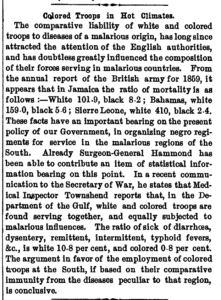Have a drink with: Black Historians
Ask them about: Maybe just listen.
Here’s something I found while I was researching this week. It’s a column from a September 1863 issue of Scientific American:

Part of the process of researching a subject is looking at all the adjacent issues that you encounter along the way, building a sense of daily consciousness and public culture in a given era. And I was still shocked – and absolutely should not have been – at the clinical distance with which the authors talk about black soldiers in the Civil War, and the suggestion that even the Union army thought of black men as such commodities that they’d rather send them in than risk white soldiers dying of malaria.
So it’s time to sit in that discomfort, and recommend that we all do more to understand America’s history of inequality. There are a lot of titles here, and this is just a small selection. I’m not going to link them – you can choose where you’d like to purchase (but bookshop.org and indiebound.org are cool because they help you support your favorite local bookstores).
Read:
Ibram X. Kendi, Stamped From the Beginning
Richard Rothstein, The Color of Law
Paul Ortiz, An African American and Latinx History of the United States
James Loewen, Lies My Teacher Told Me (Loewen has also written about, and crowdsources research on, sundown towns – communities where black Americans were historically welcome to work, but not to live)
Watch:
Watch Eric Foner’s talk on Reconstruction: America’s Unfinished Revolution
Listen:
The Uncivil podcast is a fantastic dive into the unheard stories of the Civil War and their modern echoes.
And, by the way, go ahead and support the work of black historians – especially women. You might try:
Annette Gordon Reed, The Hemingses of Monticello
Erica Armstrong Dunbar, Never Caught: The Washingtons’ Relentless Pursuit of Their Runaway Slave, Ona Judge
Next up on my reading list are:
Daina Ramey Berry and Kali Nicole Gross, A Black Women’s History of the United States
Stephanie Jones-Rogers, They Were Her Property
Leslie M. Harris, In the Shadow of Slavery: African Americans in New York, 1626-1863
Not all historians are academics, either. You might look into Nikole Hannah-Jones’ 1619 Project and engage with its claims and criticism, including angles from historians, journalists, and scholar fact-checkers who doubt its central thesis.
Even your cookbooks are involved. Check out Toni Tipton-Martin’s Jubilee and its examination of black traditions and cooking excellence – as Tipton-Martin’s publisher noted, “After all, if Thomas Jefferson introduced French haute cuisine to this country, who do you think actually cooked it?”
Find these and other scholars writing about the history of black America via Women also Know History.
